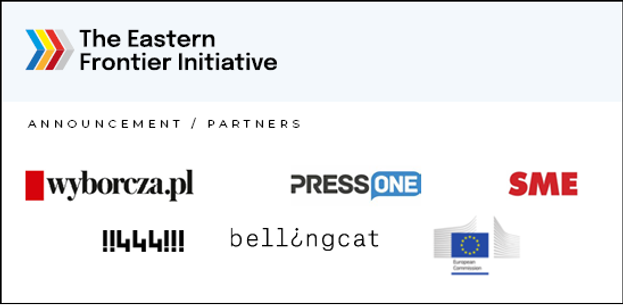The fact that a relatively small Russian firm, Mirelix – owned by Igor and Maria Troianovskii from St Petersburg – holds commercial contracts with Russia’s federal security agency, the FSB, would not normally raise eyebrows in Slovakia, even though FSB agents have been involved in the war in Ukraine.
What makes the story significant from a Slovak perspective is that part of Mirelix’s business with the FSB – one of the key pillars of the Russian regime, which officially designates Slovakia as a hostile country – was conducted from a village just 10 kilometres outside Bratislava.
In late August 2022, as Ukraine launched a counteroffensive in the Kherson region and Russian forces came under heavy shelling, the Russian Federal Security Service (FSB), the successor to the infamous KGB, was closely monitoring the situation.
Just days earlier, Mirelix had delivered crystal oscillators – commonly used in satellite and radio communications – to "Military Unit 45187", a subdivision of the FSB. A few months later, the company supplied the agency with additional radio components.
Around the same time, Igor Troianovskii acquired a flat in a residential building on the outskirts of Chorvátsky Grob, a village near Bratislava.
The Slovak daily Sme began investigating the case at a time when Prime Minister Robert Fico had already announced plans to visit Russia for Victory Day celebrations – making him the only EU leader at the event. Sme reporters met the couple, but they declined to comment on their activities.
From St Petersburg to Slovak suburbia
The first official trace of Igor Troianovskii’s presence in Slovakia dates to 57 days after Russia launched its full-scale invasion of Ukraine in February 2022, and 46 days after Slovakia was placed on Russia’s list of "unfriendly" countries.
According to Slovakia’s business register, someone of the same name registered as a sole trader on 22 April 2022, listing an address on Obchodná Street in central Bratislava. The business scope ranged from running nurseries and offering moving services to manufacturing motor vehicles. Less than a month later, on 16 May, Troianovskii added "advertising, marketing, and photography services" to his list of activities.
However, Sme reporters found no evidence of any such operations at the registered address, which turned out to be a virtual office provider in one of Obchodná Street’s courtyards. The building displayed a board listing over 2,200 businesses and sole traders registered at the site, including "Igor Troianovskii".
The office manager confirmed to Sme that Troianovskii’s registration remains active.
Another public record of Troianovskii’s activities in Slovakia appears in the land registry. On 10 August 2022, roughly six months after registering his business, he became the owner of a flat in Chorvátsky Grob.
According to public posts by Maria Troianovskaia on Facebook, the couple resides at this address. A video from November 2024 shows children playing in a nearby playground.
Troianovskaia appears to be an animal rights advocate. She shared a petition criticising Russian authorities for the killing of stray dogs ahead of the 2018 FIFA World Cup.
Deals with the FSB, which plays a role in Ukraine’s destruction
When registering the flat in Chorvátsky Grob, Troianovskii listed his permanent residence as a specific address on Dunaisky Prospekt, in a high-rise apartment block in St Petersburg.
The same address is listed in Russian company registries as the headquarters of Mirelix, founded in December 2015 by Maria Troianovskaia, with Igor Troianovskii serving as general manager.
According to public records, Mirelix has signed contracts with 28 companies totalling around 28 million roubles – roughly €300,000.
Its largest client is the Federal State Budgetary Institution known as Military Unit 45187, with 13 contracts worth a combined €158,000. Another key client is Military Unit 45185.
The details of these contracts are not publicly available, but Mirelix’s basic website states that the firm supplies "electronic components, IT products, and electrical equipment from global manufacturers across the Russian Federation.
Were such goods to be exported from the EU to Russia, they would likely fall under dual-use sanctions – products that can serve both civilian and military purposes. Sme was unable to determine whether Mirelix trades within the EU. The couple did not respond to this question.
EU sanctions can also be breached by EU citizens or residents – including Russian nationals – if they are formally employed by Russian companies offering prohibited services, such as IT consulting or accounting.
Military units like 45187 are agencies set up by the FSB, which handles intelligence, counterintelligence, border security, and anti-terrorism.
A study by King’s College London notes that the FSB has become increasingly militarised, prioritising operations in Ukraine.
Investigations by The Washington Post and award-winning investigative outlet The Insider have mapped some of these military units, including those linked to Troianovskii’s firm.
FSB unit with a shadowy history
In the first year of Russia’s invasion of Ukraine, microchips worth tens of millions of dollars from American tech companies entered Russia, often via firms in non-sanctioned third countries.
These Russian firms then supplied components to subsidiaries in the Russian military-industrial complex – including the FSB, nuclear agency Rosatom, and arms manufacturer Rostec.
These chips are integral to the Kremlin’s war effort, used in missile systems and satellite communications, as well as in attacks on Ukrainian civilian infrastructure.
Military Unit 45187, with which Mirelix did business, received some of these components. The unit reportedly focuses on "research and development".
In the past, Unit 45187 was suspected of using cover companies to mask its agents. For instance, from 2008 to 2010, a St Petersburg firm called RUST provided maintenance services to the unit.
According to the Dossier Centre – a watchdog funded by exiled Russian businessman Mikhail Khodorkovsky – RUST also issued an employment certificate for a man named Vadim Sokolov, stating he worked as a design engineer from 2017 to 2019.
Sokolov used this certificate to apply for a visa to the EU. But his real name is Vadim Krasikov, an elite FSB operative who assassinated Chechen dissident Zelimkhan Khangoshvili in a Berlin park in broad daylight in August 2019.
German courts sentenced Krasikov to life imprisonment. He later became a key figure in a high-profile prisoner swap between Russia and the West, which included the release of Washington Post journalist Evan Gershkovich and 15 others. The Kremlin confirmed that Krasikov served in the FSB’s elite Alpha unit, alongside members of the presidential security service.
When journalists questioned the now-defunct RUST company about Krasikov’s alleged employment, they denied it.
Slovak journalists met with hostility
When Sme reporters first visited the couple in Chorvátsky Grob, no one responded. On a weekday afternoon, only a barking dog answered the intercom.
The next morning, a man opened the building door. When asked if he was Igor Troianovskii, he confirmed. But after multiple attempts to explain their interest in Mirelix and its links to the FSB, he refused to speak further and shut the door.
As the journalists returned to their car, a woman approached and photographed the vehicle’s licence plate. It was Maria Troianovskaia. She refused to answer questions, said she had been followed for two days, and threatened to call the police. The journalists had been at the building for under ten minutes each time. She eventually shouted that she would only respond via email.
Sme sent detailed questions to publicly available email addresses linked to Mirelix. They asked whether the firm was still operating, how it viewed its continued business with the FSB after the invasion, whether it traded in EU components, whether it had other ties to the FSB, and why the couple had chosen to move to Slovakia.
No response has been received.
Over 3,000 Russians arrived in Slovakia after the invasion
After the invasion began, Slovakia – under then-Prime Minister Eduard Heger – and the European Union debated how to handle Russian nationals seeking entry into the Schengen Zone.
In September 2022, Slovakia’s Foreign Ministry announced it would not issue humanitarian visas to Russians fleeing military conscription. Around the same time, Slovakia joined 21 other EU countries in suspending the 2007 visa-facilitation agreement with Russia.
The new rules included extended application processing times and more rigorous background checks. However, these changes were implemented months after the invasion began.
Igor and Maria Troianovskii obtained Slovak residency before then. It remains unclear whether they arrived before or after the invasion.
According to Slovakia’s Interior Ministry, there were nearly 7,500 valid Russian residency permits in Slovakia during 2022. That number rose to 8,400 in 2023. These figures include both pre- and post-war arrivals.
Further data show that 2,999 residency permits were granted to Russians in 2022, and more than 3,400 were issued in 2023.
The Eastern Frontier Initiative
This article was written in the framework of The Eastern Frontier Initiative (TEFI) project. TEFI is a collaboration of independent publishers from Central and Eastern Europe, to foster common thinking and cooperation on European security issues in the region. The project aims to promote knowledge sharing in the European press and contribute to a more resilient European democracy.
Members of the consortium are 444 (Hungary), Gazeta Wyborcza (Poland), SME (Slovakia), PressOne (Romania), and Bellingcat (The Netherlands).
The TEFI project is co-financed by the European Union. Views and opinions expressed are however those of the author(s) only and do not necessarily reflect those of the European Union or the European Education and Culture Executive Agency (EACEA). Neither the European Union nor EACEA can be held responsible for them.




